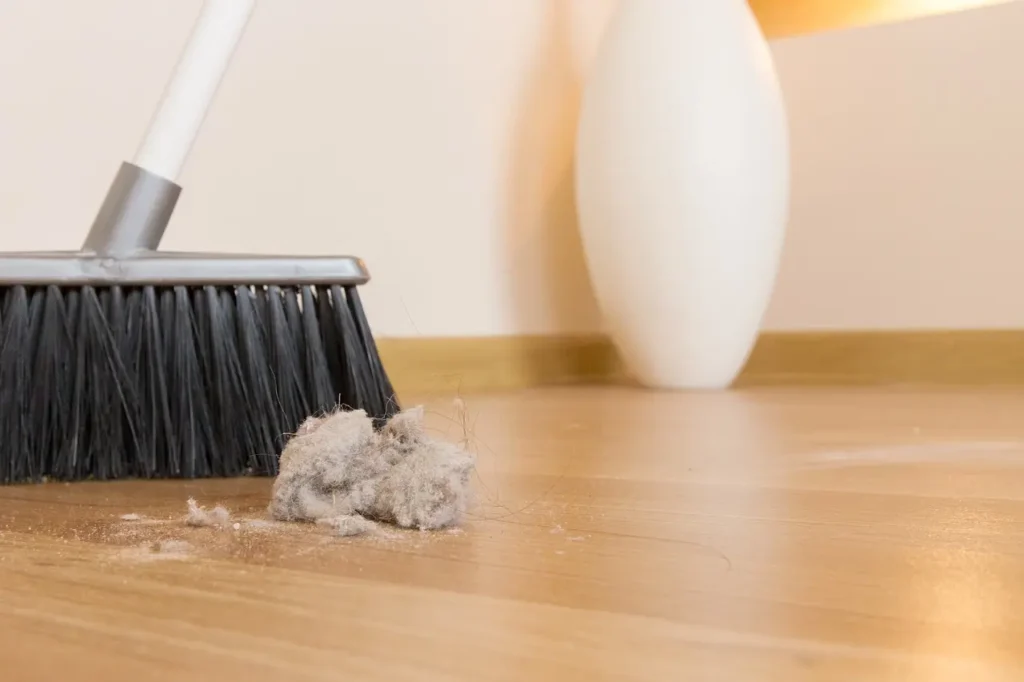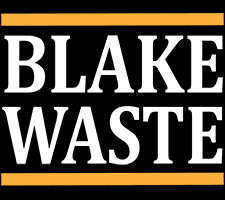Hoarding disorder is a complex and often misunderstood condition that can have profound impacts on the lives of those who experience it. As caring individuals, we need to educate ourselves and learn effective ways to help those struggling with this disorder. That’s why our Raleigh junk removal experts from Blake Waste are covering the intricacies of hoarding disorder, exploring its underlying causes, recognizing its symptoms, and most importantly, discovering practical strategies to provide the support and empathy that hoarders need. By the end of this post, you will be able to understand how to help a hoarder.

Understanding Hoarding Disorder
Hoarding disorder is a complex psychological condition that goes beyond mere clutter and disorganization. It is characterized by persistent difficulty in discarding or parting with possessions, regardless of their value, leading to an excessive accumulation of items that gradually overwhelm living spaces. This mental health disorder affects people from all walks of life and can have severe consequences on their physical and mental well-being, as well as their relationships and overall quality of life.
Recognizing the Signs of Hoarding In A Loved One
Hoarding disorder is often a secretive and hidden condition, making it challenging to identify in a loved one. However, early recognition of hoarding disorder symptoms is crucial for providing timely support and intervention. Here are some common indicators that may suggest hoarding behavior in someone you care about.
Persistent Difficulty Discarding
Hoarders find it incredibly challenging to let go of possessions, regardless of their value or usefulness. They may display an intense emotional attachment to items and have a strong fear of regretting discarding hoarded items in the future.
Excessive Clutter
The accumulation of items that gradually overwhelms living spaces is a hallmark of compulsive hoarding disorder. Rooms become filled with clutter, making it difficult to move around or use furniture. Storage spaces, such as closets, basements, or garages, may be overflowing with possessions.
Inability to Organize
Hoarders struggle with organizing their belongings. They may lack a clear system for categorizing or arranging items, leading to chaotic living conditions. As a result, finding specific items or accessing essential areas of the home becomes increasingly challenging.
Emotional Distress or Anxiety
The thought of discarding possessions can cause significant distress and anxiety for individuals with hoarding disorder. They may express overwhelming feelings of loss, fear, or discomfort when confronted with the idea of parting with their belongings.
Difficulty Making Decisions
Hoarders often face extreme difficulty in making decisions, even about simple matters. They may get stuck in a loop of indecisiveness, constantly weighing the potential consequences of letting go or keeping each item.
Social Isolation
The shame and embarrassment associated with hoarding can lead to social withdrawal. Hoarders may avoid inviting guests or relatives to their homes, feeling anxious about judgment or criticism. They may also distance themselves from social activities, prioritizing the accumulation and management of possessions instead.
Impaired Functioning
Hoarding can interfere with daily functioning, affecting essential activities such as cooking, cleaning, or personal hygiene. Living spaces become crowded and unsanitary, increasing the risk of falls, fires, or health hazards.
How Can I Approach a Loved One About Their Hoarding Disorder?
Approaching a loved one about their hoarding tendencies requires sensitivity, understanding, and a non-judgmental attitude.
Educate Yourself
Before addressing the mental health problem itself, take the time to educate yourself about hoarding disorder. Understand its causes, symptoms, and available treatment options. This will enable you to approach the conversation with empathy and knowledge.
Choose the Right Time and Place
Find a suitable time and private setting to have a conversation with your loved one. Ensure that you have ample time to talk without distractions or interruptions. Approach the conversation with a calm and non-confrontational mindset.
Use Empathy and Compassion
Express your concern and care for their well-being. Let them know that you are there to support them and that you want to understand their perspective. Avoid blaming or criticizing them, as this can further isolate them and hinder open communication.
Listen Without Judgment
Give your loved one an opportunity to express their thoughts and emotions without interruption. Be a good listener and validate their feelings. Avoid minimizing their concerns or dismissing their attachment to possessions. Show understanding and acknowledge their challenges.
Offer Help and Resources
Suggest professional assistance such as therapists, online counseling, treatment programs, professional organizers, or support groups specializing in hoarding disorder. Emphasize that it shows strength and is a good step in a positive direction to seek treatment and find support.
Enlist Other Family Members as Support
In addition to local resources, including other family members in the process of helping a loved one with a hoarding disorder can provide a valuable network of support and resources. By involving family members, you can create a united front that reinforces the message of care, empathy, and encouragement.
Set Realistic Expectations
Understand that change takes time and that overcoming hoarding disorder is a gradual process. Encourage small steps towards decluttering and organizing rather than expecting immediate transformation. Support their progress and encourage them along the way.
Seeking Treatment for Hoarding Disorder
If you or a loved one is struggling with hoarding disorder, it is crucial to seek professional treatment. Hoarding disorder is a complex mental health condition that often requires specialized intervention to address the underlying issues and promote lasting change.
Recognize the Need for Help
Acknowledge that hoarding disorder is a serious condition that can significantly impact the quality of life. Accepting the need for professional assistance is an essential first step toward recovery.
Consult with a Mental Health Professional
Reach out to a mental health professional experienced in treating hoarding disorder. This can be a psychologist, psychiatrist, or therapist who specializes in hoarding or related disorders. They can provide a comprehensive assessment, diagnosis, and personalized treatment plan.
Support Groups
Joining a hoarding-specific support group can provide valuable peer support, encouragement, and practical advice. These groups offer a safe space to share experiences, learn from others, and foster a sense of belonging.
Professional Organizers
Consider engaging the services of a professional organizer who specializes in working with hoarding disorder. These professionals can provide hands-on assistance, guidance, and structure during the decluttering and organizing process.
Patience and Persistence
Overcoming hoarding disorder is a gradual and ongoing process. It requires commitment, patience, and persistence from both the individual and their support system. Encourage the person seeking treatment to stay dedicated to their treatment plan, even during challenging times.
How To Help Someone With Hoarding Disorder
When someone you care about struggles with hoarding disorder, offering help and support can make a significant difference in their journey toward recovery.
Encourage Them to Join a Support Group
Support groups specifically tailored for individuals with hoarding disorder can provide a sense of community, understanding, and encouragement. Encourage your loved one to participate in these groups where they can share experiences, learn coping strategies, and receive support from others facing similar challenges.
Focus on the Person, Not the Possessions
When offering support, prioritize the individual's well-being and emotional needs over the possessions themselves. Express your concern for their health, safety, and overall quality of life. Avoid judgment or criticism and emphasize your desire to support them on their journey towards recovery.
Don't Enable Hoarding Behavior
It's important not to enable hoarding behavior by helping the person acquire more possessions or by storing their excess items in their own space. Encourage responsible decision-making and discourage the excessive acquisition of items. Set boundaries that promote healthier habits and encourage a clutter-free living environment, like removing extra furniture.
Don't Expect a Quick Clean-Up
Recovery from hoarding disorder is a gradual process. It's essential to understand that cleaning up a hoarded space requires time, patience, and a comprehensive approach. Avoid pressuring the individual for quick results by beginning in small increments where a few items are discarded at a time. Focus on supporting their progress one step at a time and remember to celebrate small victories.
Utilize Dumpster Rental Services
Renting a dumpster can be helpful during the decluttering process. It provides a convenient and efficient means to dispose of large quantities of items that are no longer needed or salvageable. Consult with a dumpster rental service that specializes in hoarding situations to determine the appropriate size dumpster and duration for your specific needs.
Considerations for Hiring Junk Removal Services
When considering hiring junk removal services for hoarding situations, keep the following in mind:
- Seek experienced professionals who have expertise in handling hoarding disorders and understand the associated sensitivities.
- Look for companies that prioritize compassion, empathy, and respect for the hoarder's emotional well-being throughout the removal process.
- Ensure that the junk removal service can handle the volume and complexity of the hoarder's situation.
- Discuss the specific needs and goals with the service provider to develop a customized plan for decluttering and removal.
- Clarify expectations regarding confidentiality, privacy, and disposal methods to ensure a smooth and respectful process.
Take the First Step Towards a Clutter-Free Life with Blake Waste's Compassionate Services
At Blake Waste, we are committed to providing compassionate services to help individuals take the first step toward a clutter-free life. Our specialized waste management services in Raleigh, NC, are designed to assist hoarders and their families in navigating the process of decluttering, organizing, and creating a safer living environment.
If you, a family member, or a friend is suffering from hoarding disorder, we can embark on a journey of understanding, empathy, and practical solutions. Let's work hand in hand to provide the care, guidance, and professional assistance needed for your loved one's recovery from hoarding disorder.
Contact our residential waste management team today by calling 919-271-8675 or filling out the contact form below.

